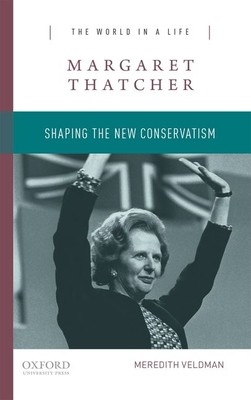
- We will send in 10–14 business days.
- Author: Meredith Veldman
- Publisher: Oxford University Press, USA
- Year: 2015
- Pages: 232
- ISBN-10: 0190248971
- ISBN-13: 9780190248970
- Format: 12.7 x 20.1 x 1 cm, softcover
- Language: English
- SAVE -10% with code: EXTRA
Reviews
Description
Part of The World in a Life series, this brief, inexpensive text provides insight into the life of Margaret Thatcher. The second daughter of a provincial grocer, Margaret Roberts Thatcher was not born to privilege or power. She was not an original thinker; few of her teachers regarded her as particularly clever. What she did possess, however, was a remarkable physical constitution (she needed little sleep and was never ill), a phenomenal capacity for hard work, and a resolute ideological certainty alloyed with political adaptability and a populist sensibility. As one of the central founders of New Conservatism, Thatcher fought to shatter the post-World War II political consensus, the mainstream agreement that the central state must regulate national economic and social life in order to ensure full employment and the citizen's welfare from cradle to grave. Thatcher came of age when the postwar consensus was at its strongest. By the time she walked onto the world stage as leader of
Britain's Conservative Party in 1975, however, the ideals of social citizenship forged in the tumult of World War II had begun to break down under the pressure of economic crisis. The resulting political confusion gave Thatcher the chance she needed. As prime minister of Britain from 1979 to 1990, she initiated the move of vast areas of the economy from public or state control to private ownership. More generally, Thatcherism both fed and fed upon a growing skepticism about state activism and governmental power--although, paradoxically, under Thatcher's guidance the power of Britain's central state grew, in some areas enormously.
EXTRA 10 % discount with code: EXTRA
The promotion ends in 17d.06:22:07
The discount code is valid when purchasing from 10 €. Discounts do not stack.
- Author: Meredith Veldman
- Publisher: Oxford University Press, USA
- Year: 2015
- Pages: 232
- ISBN-10: 0190248971
- ISBN-13: 9780190248970
- Format: 12.7 x 20.1 x 1 cm, softcover
- Language: English English
Part of The World in a Life series, this brief, inexpensive text provides insight into the life of Margaret Thatcher. The second daughter of a provincial grocer, Margaret Roberts Thatcher was not born to privilege or power. She was not an original thinker; few of her teachers regarded her as particularly clever. What she did possess, however, was a remarkable physical constitution (she needed little sleep and was never ill), a phenomenal capacity for hard work, and a resolute ideological certainty alloyed with political adaptability and a populist sensibility. As one of the central founders of New Conservatism, Thatcher fought to shatter the post-World War II political consensus, the mainstream agreement that the central state must regulate national economic and social life in order to ensure full employment and the citizen's welfare from cradle to grave. Thatcher came of age when the postwar consensus was at its strongest. By the time she walked onto the world stage as leader of
Britain's Conservative Party in 1975, however, the ideals of social citizenship forged in the tumult of World War II had begun to break down under the pressure of economic crisis. The resulting political confusion gave Thatcher the chance she needed. As prime minister of Britain from 1979 to 1990, she initiated the move of vast areas of the economy from public or state control to private ownership. More generally, Thatcherism both fed and fed upon a growing skepticism about state activism and governmental power--although, paradoxically, under Thatcher's guidance the power of Britain's central state grew, in some areas enormously.


Reviews